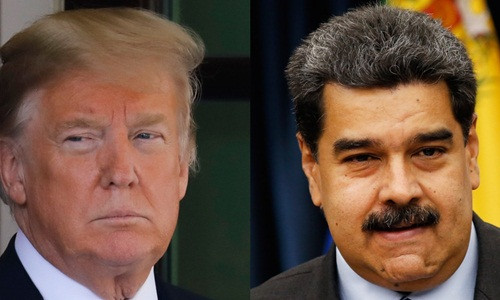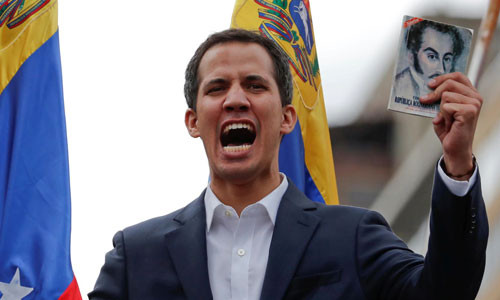The US will be bogged down if Trump intervenes militarily in the Venezuela crisis
Military intervention could push the US military deeper into the Venezuela crisis and make it impossible to get out, experts say.
|
US President Donald Trump (left) and Venezuelan President Nicolas Maduro. Photo:Washington Examiner |
US President Donald Trump has publicly stated that he is considering a "military option" to overthrow Venezuelan President Nicolas Maduro. Now, the US continues to call for Maduro to resign amid a wave of protests against him in the country. Trump said the "military option" is back on the table, according toVox.
Venezuela is facing the risk of a political crisis when two people claim to be the country's legitimate leader: Maduro, who was re-elected in May 2018, and opposition leader Juan Guaido.
Guaido asserted that the 2018 election results were tampered with and that, as president of the National Assembly, he should be the legitimate president according to the country's constitution. Guaido declared himself "interim president" on January 23 and was supported by Trump. The White House boss declared Maduro an "illegitimate" president, calling the Venezuelan National Assembly "the only legitimate branch of government elected by the Venezuelan people".
In that context, observers began to doubt the possibility that Trump could send troops to Venezuela to remove Maduro from the presidency.
But General Douglas Fraser, who headed the US Southern Command from 2009 to 2012, said military intervention in Venezuela would be the wrong move at this time. "I don't see any good reason to send in troops in the current situation," Fraser said.
Maduro remains in power and enjoys strong support from key figures in Venezuela, especially the military. On January 24, Venezuela's armed forces stressed their support for President Maduro and vowed to prevent any coup attempt to oust him.
The above statement means that if the US military wants to remove Maduro, it will face strong resistance from the Venezuelan military, which has over half a million troops.
Even if the US military succeeds in overthrowing Maduro, Venezuela will almost certainly be in a much worse state than it is now. The South American country is witnessing a severe humanitarian crisis stemming from the economic collapse and hyperinflation of recent years.
After military intervention, to stabilize the situation, the US military will still have to maintain its presence in Venezuela, which poses the risk of leading to another endless US war abroad, similar to the wars in Iraq or Afghanistan.
According to political scientists Alexander Downes and Lindsey O'Rourke, military intervention from outside the country is unlikely to change the regime in a positive direction. Citizens often express anger toward occupying forces, thereby provoking resistance movements, making withdrawal even more difficult.
General Fraser believes that instead of military intervention, the US should cooperate with allies and partners in the region to help Venezuela cope with the crisis and difficulties. Most Venezuelans are living in poverty, lacking all necessities. Millions of people have left the country, migrating to Colombia or neighboring countries with the hope of escaping misery.
“I don’t see any benefit to direct military intervention,” Fraser said, adding that President Trump should eliminate this option from his thinking.
|
Venezuelan National Assembly President Juan Guaido declared himself "interim president". Photo:Reuters |
US National Security Adviser John Bolton said the US's focus remains on preventing the Maduro government from accessing financial resources, but the process is also extremely complicated. Washington is urging other countries to "turn away" from the Maduro government.
Britain declared on January 24 that Maduro was “not the legitimate leader of Venezuela,” but other European allies were less clear. Russia, meanwhile, warned that foreign intervention in Venezuela could lead to bloodshed.
Secretary of State Mike Pompeo announced that the US is preparing $20 million in humanitarian aid for Venezuela's opposition-led National Assembly. Washington is also considering intensifying sanctions, which are targeting President Maduro rather than the Venezuelan economy.
Michael Shifter, president of the Inter-American Dialogue group, said the Trump administration's actions increased pressure on Maduro but also posed risks if the government cracked down.
The US has ignored a request from the Maduro government to withdraw its diplomats from the country within 72 hours, citing concerns that he is no longer president, in an early test of whether Washington’s policy will hold.
“The winner will be whoever can muster the strongest support to assert their claim and power in Venezuela,” said Mariano de Alba, a Venezuelan lawyer and international relations expert in Washington. “As long as the Maduro regime maintains control of the territory and has the support of the military, they will have the advantage.”



